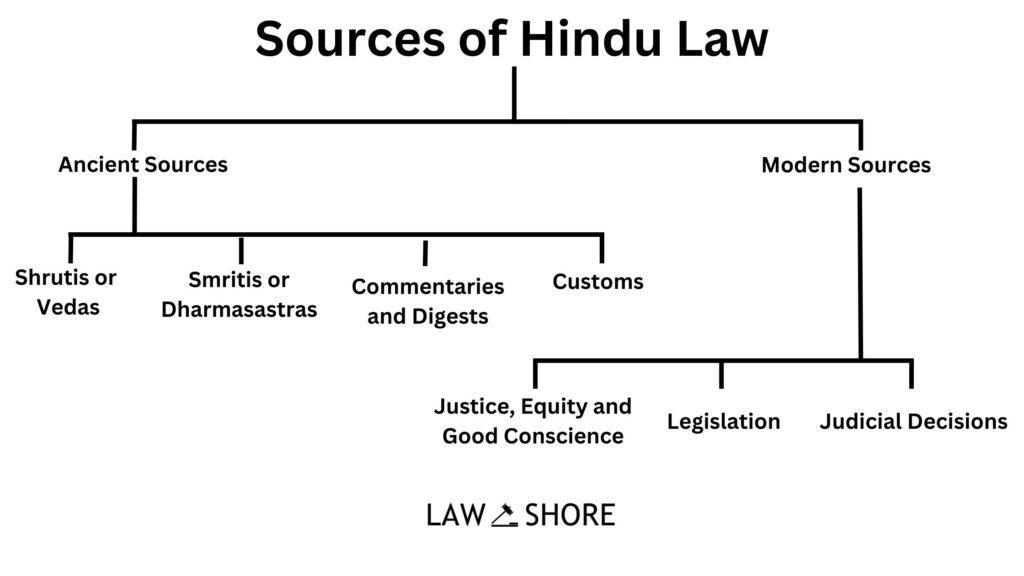Sources of Hindu Law - Origin
Table of Contents
ToggleDiscover the ancient and modern sources of Hindu law. Learn about the Vedas, Smritis, customs, legislation, and judicial precedents. Hindu law emanates from God himself, it is of divine origin. It was given by Hindu seers and sages and passed from generation to generation. It is believed that Hindu law is sacrosanct, it is divine and cannot be changed by a human as it was revealed by the God himself to our great sages.
Ancient Hindu law was a combination of moral, religious and social duties. It was not a king-made law but rather an eternal law due to its divinity. In the modern era, Hindu law has been codified and it is regarded as a personal law rather than a territorial law. A Hindu in whichever country he may be is governed by Hindu law in all personal matters.

Features of Ancient Hindu law
- Ancient Hindu law is believed to be words of God, it is sacrosanct.
- It is based on Sanskrit texts called DHARMASHATRAS comprising of Shrutis and Smritis.
- It is based on the concept of Dharma.
- It is one of the oldest jurisprudence theories.
- It has derived its main principles from the four Vedas and Upanishads.
Hindu Concept of Law Versus Austinian Concept of Law
The great jurist Austin strongly believed that law is the command of sovereign, according to him sanctions came from the state itself, the king was the lawmaker and those who disregarded the king made law were to be punished by the king himself.
Whereas the Hindu concept of law promulgates that Hindu law is of divine origin, it is revelations of God to our great sages who had attained enlightenment through Tapasya. Law was supreme because it was sacrosanct, and the king was merely the law enforcer.
Two Views Pertaining to Hindu Laws
There are two views about the origin of Hindu Law –
- Hindu law is of Divine origin.
- Hindu law is based on customs and usages.
Hindu Laws Applies to
The prevailing Hindu Laws apply to
- Hindus by birth.
- Hindus by religion or converts to Hinduism.
- Illegitimate children where both parents are Hindus.
- Illegitimate children where the father is Christian and the mother a Hindu, and the children are brought up as Hindus.
- Originally Jains, Sikhs or Buddhists by religion or those who are converts to Jains, Sikhs or Buddhists.
It can be inferred that under Hindu law, if after the birth of the child, whether legitimate or illegitimate or one of the parents converts to another religion, the child will continue to be a Hindu child, unless, in the exercise of parental rights, the child is also converted into their religion in which the parent/parents have converted.
Case Law – Maneka Gandhi V. Indira Gandhi
Sanjay Gandhi’s father was Parsi and Mother Indira Gandhi was a Hindu. In this case, it was held that Sanjay Gandhi was a Hindu because one of his parents, namely the mother was a Hindu, and she had brought up Sanjay as a Hindu.
People to Whom Hindu Law Does Not Apply
Hindu law does not apply to persons who are originally Muslims, Christians, Parsis, Jews or those who have converted to Muslims, Christians, Parsis, or Jews. A person who ceases to be a Hindu by converting to a non–Hindu religion can again become a Hindu if he reconverts to any of the four religions of Hindus i.e. Jain, Sikh, Buddhist, and Hindu.
Is the status of a person as Hindu determined by his birth?
It is believed that a Hindu is born and not made, however, this statement is incorrect. The term Hindu includes those who were born Hindus as well as those who converted to Hinduism. A non-Hindu may renounce his religion and become Hindu by conversion by any of the three methods: –
- If he performs the ceremony of conversion prescribed by the caste or community to which he converts.
- If he expresses an intention to become a Hindu and actually lives as a Hindu and the community or caste into the fold of which he is ushered in accepts him as a member of that community or caste.
- If he declares that he is a Hindu and lives as a Hindu.
Case Law – K.M Manu v. Chairman Scrutiny Committee for Verification of Community Certificate
Sources of Hindu Law
Ancient Sources of Hindu Law
Let’s take a look at some Ancient Sources of Hindu Law.
1. Shrutis – According to Vedas, shrutis are what was heard by the sages from God. They are the primary sources of Hindu law, Shrutis consist of four Vedas and Upanishads.
Following are the four Vedas
- Rig Veda – Rig Veda contains hymns and praises to deities under Hinduism.
- Yajur Veda – Yajur Veda is a collection of mantras and chants. It contains instructions for rituals of religious ceremonies.
- Sam Veda – Sam Veda consists of prayers composed in mantras that are to be chanted at sacrifices.
- Atharva Veda – Atharva Veda is a collection of prayers and hymns.
2. Smritis – Smriti means what was remembered. They were derived from Shrutis and are based on Human memory. It consists of texts written by sages and handed down to upcoming generations.
3. Commentaries and Digests – Commentaries and digests are records of the traditional customs mentioned in Smritis. There are two principal commentaries i.e. The Mitakshara and the Dayabhaga.
- Mitakshara – It is prevailing throughout India except Bengal and Assam. It covers all aspects of Hindu Law such as succession, coparcenary, partition, debt and Stridhan.
- Dayabhaga – It is the chief commentary in Bengal. It mainly deals with inheritance and partition.
4. Customs – According to Hindu Marriage Act, 1955 custom denotes any rule which, having been continuously and uniformly observed for a long time, has obtained the force of law among Hindus in any local area, tribe, community, group or family. In order that the custom must be valid it must be ancient in variable and continuous. It should be established by clear and unambiguous evidence and based on some reasonability. There are mainly three types of customs, local custom, class custom and family custom.
- Local customs – These customs belong to some particular locality or district, and they are binding on the natives of such places.
- Class custom – Such customs are of a caste or a sect or of the followers of a particular profession or occupation.
- Family custom – Such customs are related to a particular family, these are mainly related to succession or religious foundations.
Modern Sources of Hindu Law
Let’s take a look at some Modern Sources of Hindu Law.
1. Judicial Decisions – Judicial decisions constitute an imperative role in the source of modern Hindu law. A Precedent is also a source of law.
Case Law – Luhar Amritlal Nagji v. Doshi Jayantilal
The Supreme Court had observed that judicial pronouncements have become a vital component of Hindu law, effectively altering and enhancing the original Hindu legal framework, thus evolving into significant sources of contemporary Hindu Law.
2. Legislation – Legislation plays an important role in the development of Hindu law. Legislation has modified, altered and supplemented the textual Hindu Law over the last few decades, acts such as The Special Marriage Act, 1872, The Guardians and Wards Act, 1890, Indian Succession Act, 1925, Prohibition of Child Marriage Act, 2006 etc. have brought major reforms in the Hindu law and promoted justice and equality.
3. Justice, Equity and Good Conscience – Principles of justice, equity and good conscience are applicable on cases which are not governed by commentaries and justice.
Case law – Gurunath v. Kamlabai
In this case Supreme Court observed that in the absence of any rule of Hindu law, the courts have the authority to decide cases on the principles of equity justice and good conscience unless in doing so decision would be repugnant to or inconsistent with the any doctrine or theories of Hindu law.
Conclusion
Hindu Law is grounded in ancient wisdom and knowledge, following the principles of dharma. While we acknowledge its history, we must also acknowledge its capacity to adjust to changing times and maintain the principles of justice, equality, and cultural identity. The sources of Hindu law are the oldest dating back to the origin of Hinduism itself.
Moving ahead, Hindu law showcases the lasting influence of tradition in a changing world. Moreover, by delving into Hindu Law, we discover not just a system of laws but a deep-rooted philosophy that has influenced communities, households, and people over many years. As we manoeuvre through the intricacies of the contemporary age, the insights provided by Hindu Law shed light on the fine equilibrium between tradition and change.
Also, Check Out Other Topics in Family Law:
Explore Law Shore: law notes today and take the first step toward mastering the fundamentals of law with ease.

After Completing my LLB hons, I started writing content about legal concepts and case laws while practicing. I finally started Law Shore in 2024 with an aim to help other students and lawyers.



